Key Takeaways on Benefits of AI in eLearning Industry:
- Modern learning platforms help you create experiences that truly fit each person's needs
- When you tailor learning to individual strengths and weaknesses, teams progress at their ideal pace
- AI analyzes how people interact with content to spot what works and what doesn't
- Your learning strategy becomes more effective when combining personalized paths with smart assessment
- Employee learning thrives with interactive environments and support available exactly when needed
- The key benefits include doing more with less – reaching more people without increasing costs
- Better learning outcomes happen when systems adapt to how each person naturally learns
Personalized Learning Experiences
Personalized learning transforms how knowledge reaches your teams. Adaptive learning tailors content to individual needs while considering learning preferences.
This creates a truly personalized learning experience where team members study at their own pace with materials matching their optimal learning style.
Your learning journey becomes uniquely personalized when content adapts based on demonstrated strengths and weaknesses. Systems analyze performance to customize pacing while technology accommodates different learning styles through varied content formats.
Digital tutors provide one-on-one attention, and interactive interfaces adjust based on how users engage with materials.
Companies recognize this value, with over 77% implementing customized learning approaches for their teams. The technology identifies knowledge gaps as people work, ensuring no concept gets left behind.
Enhanced Content Creation and Curation
AI-powered technologies revolutionize content creation for training purposes. Modern AI tools generate quizzes, assignments, and simulations while suggesting relevant learning materials based on learner profiles.
Training content development benefits from:
- Automatic generation of practice materials and assessments
- Systems that recommend complementary resources based on learning history
- Tools that reformat content for different learning approaches
- Algorithms that enrich materials with appropriate keywords for easier finding
- Content optimization based on learner engagement data
AI-powered virtual reality creates immersive experiences where your team can practice complex skills in safe environments, making abstract concepts tangible through interactive exploration.
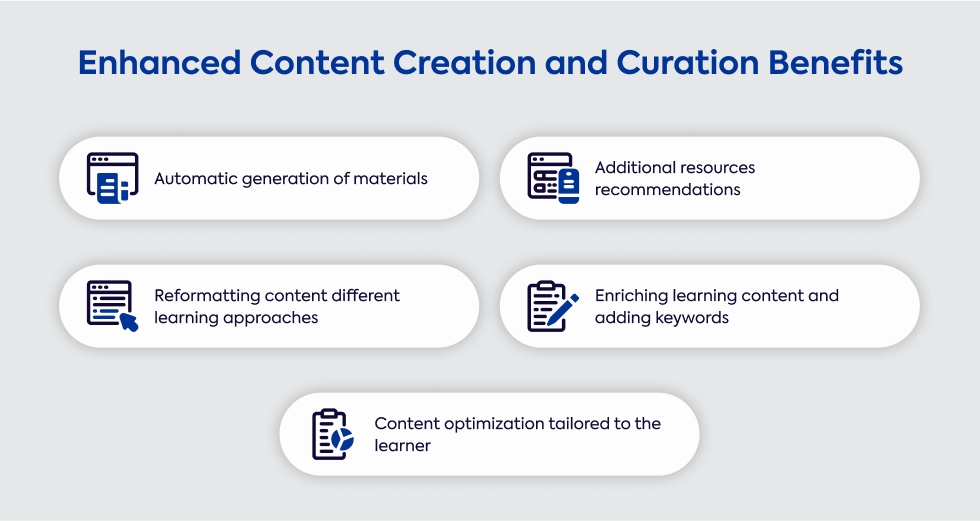
Intelligent Assessment and Feedback
AI algorithms provide insight into learner performance instantly. This immediate feedback helps your team understand their progress while concepts remain fresh in their minds.
Assessment tools powered by AI deliver several advantages through automatic grading with instant feedback to students on their performance. Question difficulty adjusts based on previous answers, creating more objective evaluation free from human biases.
For language learners, immediate pronunciation feedback accelerates improvement. The system also identifies students who might need additional support before they fall behind.
Better learning happens when assessment and instruction work together seamlessly. Virtual assistants answer questions about assignments, helping learners move forward without delays.
Advanced Learning Analytics
Modern eLearning platforms generate enormous data. AI algorithms analyze this information to uncover patterns human observers might miss.
Learning patterns reveal important insights about which teaching strategies work best for different groups. The technology identifies when students struggle with specific concepts and shows how different learning techniques affect knowledge retention.
Data clarifies what intervention methods produce the best results and where performance gaps exist between different groups.
Machine learning algorithms process this information at scale, enhancing the educational experience with evidence-based recommendations for both learners and instructors.
Automated Administrative Tasks
AI systems transform administrative processes, handling routine tasks automatically so your team can focus on what matters most.
Technology revolutionizes administration through automatic test generation and grading. Smart scheduling systems optimize resource allocation while digital assistants provide 24/7 support for common questions.
Comprehensive systems track learning progress across programs and monitor compliance with educational regulations without human intervention.
Learning management system technology streamlines record-keeping and reporting functions, freeing time for more valuable activities.
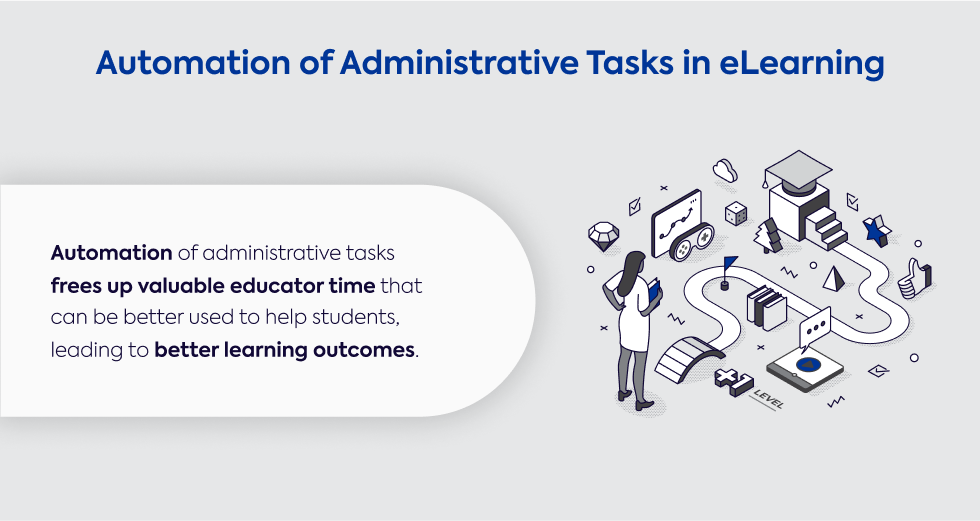
Increased Accessibility and Inclusivity
Modern systems help educators reach more diverse populations by addressing different needs and backgrounds. Traditional learning approaches often failed to accommodate differences, but new tools make education accessible to everyone.
Text-to-speech and speech-to-text tools support different learning needs. Automatic translation of content into different languages removes barriers to global education.
Advanced systems detect and eliminate bias in materials while making premium resources available regardless of location. Specialized interfaces support students with different abilities, ensuring nobody gets left behind.
Tools using voice recognition enable hands-free interaction for those with mobility challenges. An impressive 74% of education professionals believe technology makes learning more inclusive.
Interactive Learning Environments
Interactive and engaging experiences capture attention and improve knowledge retention. Today's platforms create environments where learners interact with AI and each other in meaningful ways.
Modern interactive learning environments feature gamification elements that increase motivation and provide virtual assistants offering real-time guidance.
Conversational practice partners enhance language learning while immersive simulations allow for practicing complex skills in safe environments. The most effective systems include adaptive content that responds to learner actions, maintaining optimal engagement.
Students learn more effectively when content adjusts to maintain an optimal challenge level. The learning experience for students improves dramatically when systems adapt to individual progress.
Skill Gap Identification and Development
AI learning systems help identify precisely what skills need development for individual career growth within your organization. This targeted approach makes training more efficient and relevant.
The way AI supports skill development includes real-time identification of knowledge gaps during assessment. The technology predicts skills needed for future job requirements and matches employees with learning opportunities based on development needs.
Your team benefits from personalized learning paths for career advancement and identification of transferable skills that facilitate career transitions.
Corporate learning programs benefit from these insights by focusing resources where they'll have the greatest impact. Training and development becomes more strategic when based on concrete data rather than assumptions.
Cost-Effective Scaling of Quality Education
eLearning platforms change the economics of education, making excellent instruction affordable at scale. The impact on eLearning economics has been dramatic.
The advantages of AI in eLearning include significant financial benefits:
- Reduced costs for physical facilities and materials
- Ability to serve thousands of learners simultaneously
- Lower content development and maintenance expenses
- Elimination of geographical barriers to access
- Creation of affordable options for organizations of all sizes
The eLearning industry continues growing rapidly, with projections showing the market reaching $17.8 billion by 2027. Another analysis suggests growth to $47.7 billion by 2030.
Companies report tangible benefits, with 42% experiencing increased revenue after implementation. Additionally, 45% cite cost reduction as a primary motivation for adoption.
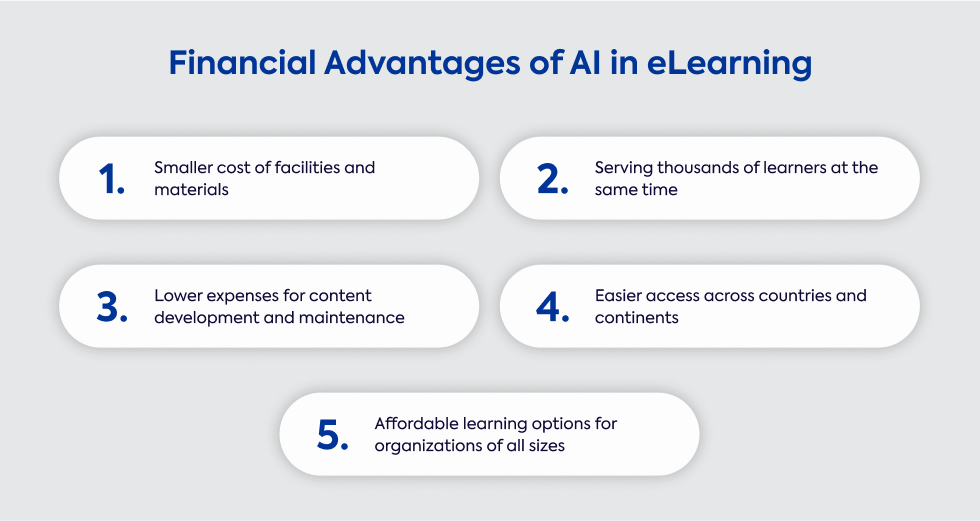
Enhanced Learner Engagement and Retention
Technology offers new tools for enhancing the learning experience and improving completion rates. The learning process becomes more engaging when content adapts to individual interests and progress.
Effective engagement strategies include interactive experiences through gamification elements and content personalized to individual interests.
Difficulty levels adjust to maintain optimal challenge while immediate support addresses questions as they arise. Regular feedback on progress and achievements keeps motivation high throughout the learning process.
Learning tools that provide progress tracking help maintain motivation throughout courses. AI features like intelligent recommendations keep content fresh and relevant to personal goals.
Real-Time Support and Assistance
Real-time assistance technologies ensure help remains available whenever learning happens. This immediate support prevents minor confusion from becoming major roadblocks.
Online learning benefits from 24/7 chatbot availability for common questions. Learners receive instant guidance when they encounter difficulties through conversational interfaces that feel natural to use.
For diverse teams, instant translations support non-native speakers, while complex concepts receive quick, clear explanations when needed.
AI becomes most valuable when it removes friction from the learning experience, helping your team progress smoothly without unnecessary waiting.
Predictive Analytics for Learning Success
Benefits of AI in education include sophisticated forecasting capabilities that identify potential issues early. These systems analyze patterns from thousands of learners to predict likely outcomes.
The use of AI in eLearning includes predictive features such as:
- Early warning systems for students at risk of falling behind
- Performance forecasting based on behavior patterns
- Optimal learning approaches for different profiles
- Prediction of knowledge retention and optimal review timing
- Course completion likelihood assessment
AI in learning and development helps organizations understand what interventions work best for different situations. This evidence-based approach improves outcomes while making efficient use of resources.
Efficient Upskilling and Reskilling
AI technologies help workers stay current through targeted learning recommendations. This efficient approach ensures time spent learning translates directly to improved job performance.
Artificial intelligence transforms training by streamlining the process of acquiring new skills and creating optimized learning paths based on existing knowledge.
The technology suggests microlearning opportunities that fit busy schedules while matching employees with training aligned to career goals. For organizations managing workforce transitions, AI identifies transferable skills that accelerate reskilling.
AI is transforming how organizations approach workforce development. Rather than generic training for everyone, systems create personalized plans based on individual roles and backgrounds.
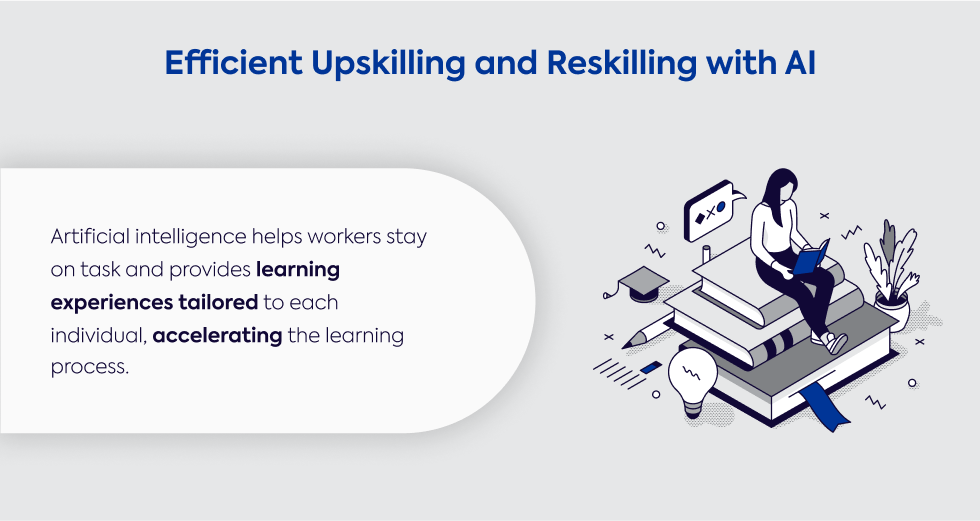
Data-Driven Continuous Improvement
Machine learning systems analyze performance data to identify what works and what needs improvement. This feedback loop ensures continuous refinement of your training materials and methods.
Examples of AI in improvement processes include analysis of which content formats achieve best results. The technology enables testing different approaches through controlled experiments and measures the effectiveness of various teaching strategies.
Your courses improve as the system identifies concepts that commonly cause confusion and optimizes learning paths based on successful patterns.
AI software constantly monitors performance metrics across thousands of learners, identifying patterns human observers might miss. These insights help course developers make evidence-based decisions about improvements.
Future-Ready Learning Environments
AI makes it possible to create adaptable, forward-looking systems that prepare your team for tomorrow's challenges, not just today's.
Shaping the future of education means preparing learners for evolving workplace requirements through immersive practice environments built with virtual reality. Complex concepts become accessible through interactive simulations that eliminate abstract barriers to understanding.
Modern platforms connect learners with similar interests across geographical boundaries while supporting lifelong learning with personalized recommendations.
AI in learning and development contexts helps organizations stay competitive by continuously developing workforce capabilities. Organizations recognize these benefits, with 44% including these technologies in their short and mid-term education plans.
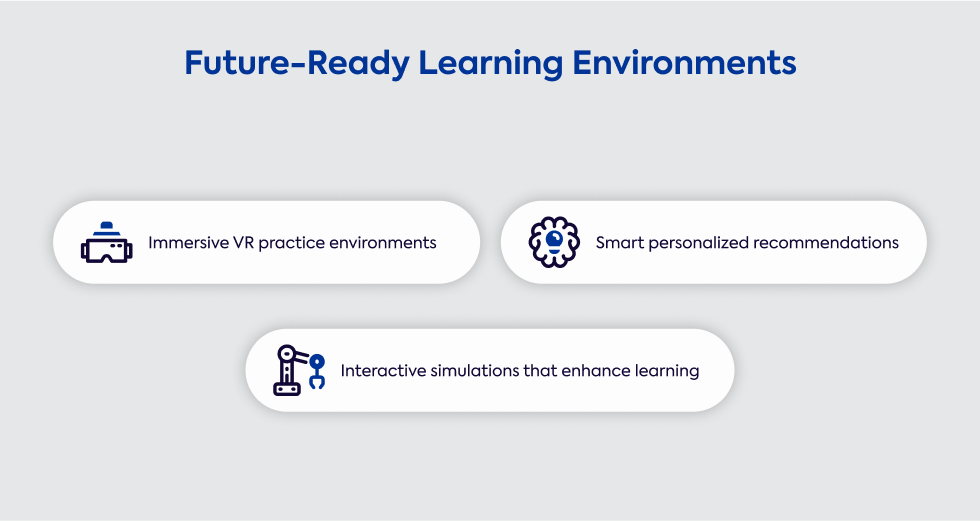
Want to Make AI Work for Your eLearning Programs?
Reading about AI benefits is one thing, but making them happen takes know-how. We at Gauss build custom eLearning solutions that fit what your organization actually needs.
Stuck with these common problems?
- Learning programs that treat everyone the same
- Content that doesn't keep people interested
- Trouble spotting where your team's skills fall short
- Training costs that keep climbing
Our team knows how to handle the tricky parts of adding AI to your learning programs and can build something that gets real results.
Talk to Gauss today about turning your eLearning ideas into reality.
